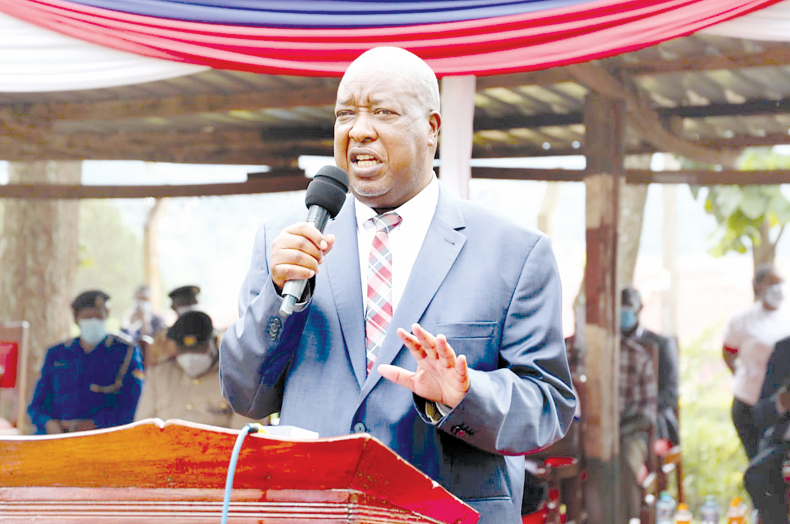Treasury CS Yatani’s budget elicit mixed reactions

Lilian Kaivilu, David Musundi and Winstone Chiseremi
The national budget presented by National Treasury Cabinet Secretary Ukur Yatani in Parliament yesterday elicited mixed reactions from Kenyans, with many expecting it would lead to reduction of prices of basic commodities.
Others, however, said the budget provided no tangible benefits to the ordinary Kenyan.
Grace Achieng’, a trader at Olympic area in Kibera, believe the budget projections will, if implemented properly, cushion ordinary citizens from the impacts of Covid-19 pandemic.
The fruit vendor acknowledged that the economy had taken a dip, but urged the Treasury to come up with measures to cushion small traders.
“Unlike other years, the cost of doing business has gone up. Due to the lockdown and restrictions of movement, there are delays in delivering groceries.
This is also accompanied with increased cost of the same,” she says. According to her, selling perishable commodities is even more difficult as she is forced to sell at throw-away prices.
Achieng’ said her customers are mainly teachers and students from Olympic Primary and High School as her main customers.
But with the closure of schools since March, the mother of six says her sales have dropped.
“Previously, I would sell up to Sh2,000 per day. But now I barely make even Sh600,” she said, urging the government to further cushion traders who have been hit hard by the effects of Covid-19.
In his budget speech yesterday, Treasury Cabinet Secretary Ukur Yatani spelt out plans by the government to safeguard livelihoods and ensure speedy economic recovery.
The ministry suggested a roll-out of an economic stimulus programme that will catalyse economic activity and to enable businesses to recover from the adverse effects of Covid-19.
But another Haji Mohammed, another Kibera resident was not optimistic as Achieng’.
According to him, the budget was numbers and no tangible benefits to ordinary citizens.
“To us, the budget speech can only make sense if we can see real reduction of prices of different commodities,” he said, adding: “It will only make sense to me if I can buy a litre of kerosene at Sh80, down from the current Sh100 per litre.”
Like Mohammed, many Kenyans, a better economy is only evident in practical reduction of the basic commodities such as food and other essentials.
Mohammed, a teacher, said the budget should focus on recovering the losses caused by Covid-19, locust invasion and floods witnessed in different parts of the country.
Kazi Mtaani
Yatani expounded an eight-point economic stimulus programme aimed at sustaining economic growth despite the current shocks.
To address youth unemployment in informal settlements, he said the Treasury has set aside Sh10 billion under the Kazi Mtaani programme which targets unemployed youth in Nairobi, Mombasa, Kisumu, Eldoret and Nakuru who will be engaged in fumigation, storm water drainage works and cleaning of markets and informal settlements.
“The Kazi Mtaani Programme targets to employ 200,000 youth,” said the CS.
In Trans Nzoia, residents lauded Yatani for putting up interventions to ease credit facilities after businesses and families’ income sources were shattered by the pandemic.
They said the CS’s announcement on measures to have county governments clear all pending bills will go a long way in improving livelihoods of small traders in the county.
Tobias Odour, a contractor who offers the county government mechanical works, said the move will resuscitate businesses that had collapsed after lending institutions auctioned most of the traders’ property.
“My garage business was greatly affected not only by coronavirus pandemic but also failure by the county government to pay me Sh45 million for work done’’, he told the People Daily in Kitale.
Another businessman, Peter Ouma, however, said the Treasury should have put in more stringent measures to access loans after banks denied them funding for projects.
Trans Nzoia County Assembly budget committee chairman David Kisaka praised the budget and urged Yatani to seal all graft and wastage loopholes to ensure the Sh2.733 trillion estimates do not sink into the holes of corruption.
Reduce taxation
He asked said the Sh53.74 billion economic stimulus programme should trickle down to all the devolved units.
Kenneth Muyundo, who operates a chain of hotels in Trans Nzoia county, said the government should assist all hoteliers by reducing taxation to cushion them from the adverse effects caused by coronavirus.
“Taxes on hotels especially in this place will hurt our already suffering businesses that have not benefited from recent loan advanced to five star hotels in bigger Towns,’’ he said.
Meanwhile, farmers in North Rift region reacted angrily to the budget, saying the government had failed to allocate more money to the agriculture sector to ensure food security in the wake of Covid-19 pandemic and locust invasion.
They faulted Yatani for allegedly overlooking the issue of subsidy in a bid to reduce the cost of production for the benefit of the farming community and consumers.
Led by Kipkori Menjo, they said it was unfortunate that the agricultural sector had not been given the attention it deserves despite the important role it plays.
“The budget has not touched anything on the issue of subsidy which the farmers were waiting to hear as they have suffered due to exorbitant prices of farm input and yet they are expected to produce enough food for the country,” said Menjo.
He said the government failure to address their plight and would push the cost of production up, noting that the effect of the move will impact on the consumers.
“We have been giving our views on how the government should tackle the issue but sadly it has never been factored in the budgets read by successive ministers,” he said.
However local contractors welcomed the budget, saying it will give them first priority in awards of tenders for local infrastructural projects and boost the economy.
Led by Julius arap Kayoi, the contractors said for a long time they have been overlooked in award of tenders for various multi-billion-shilling State projects.















